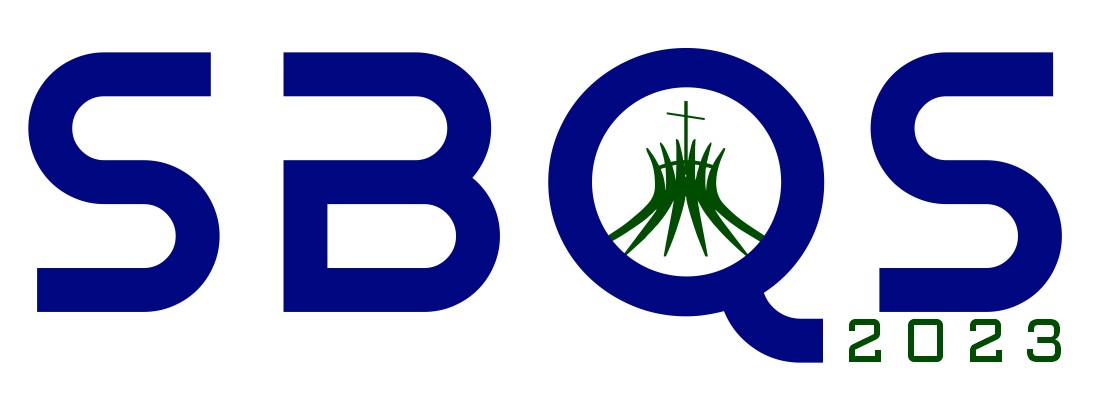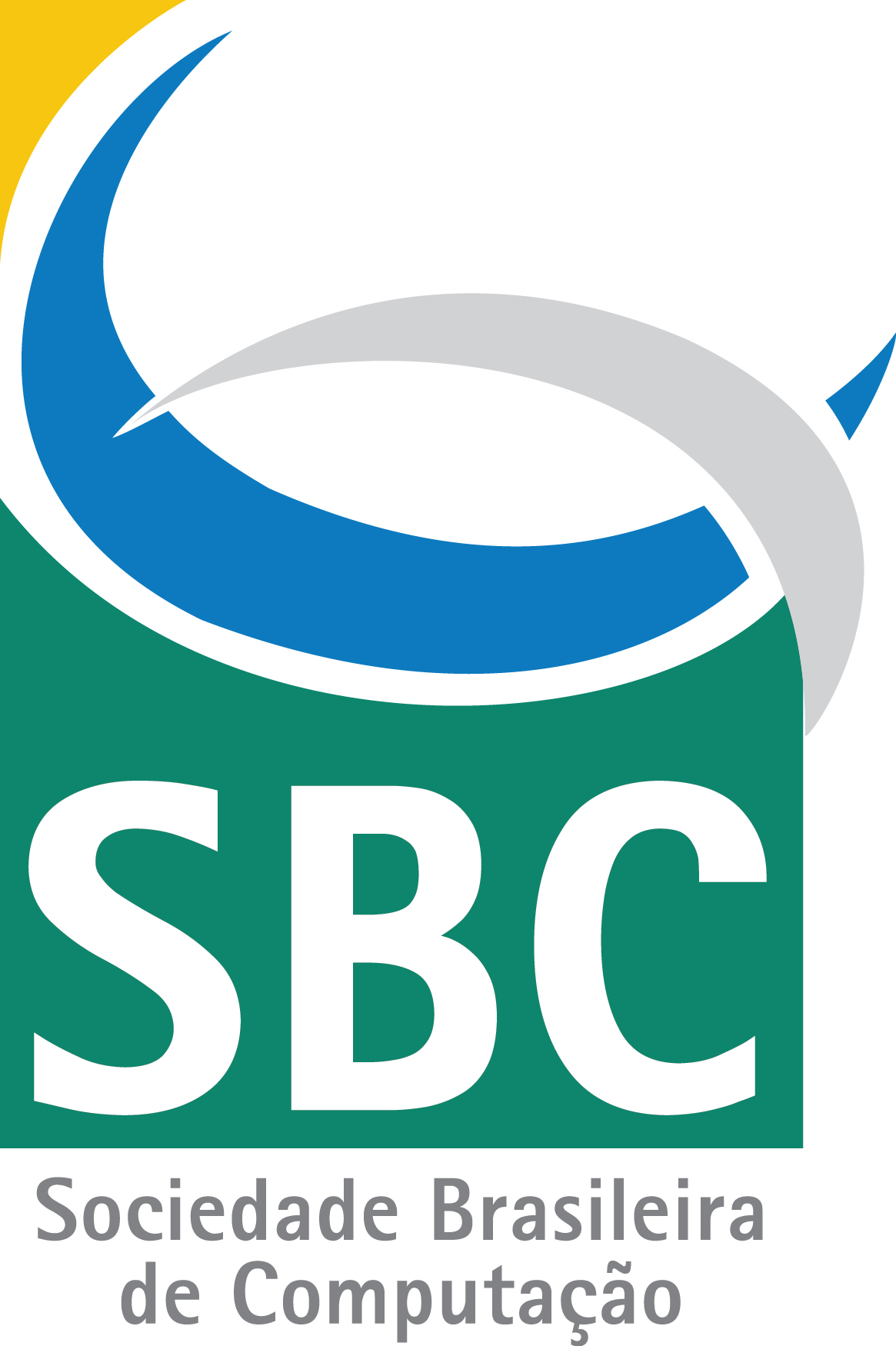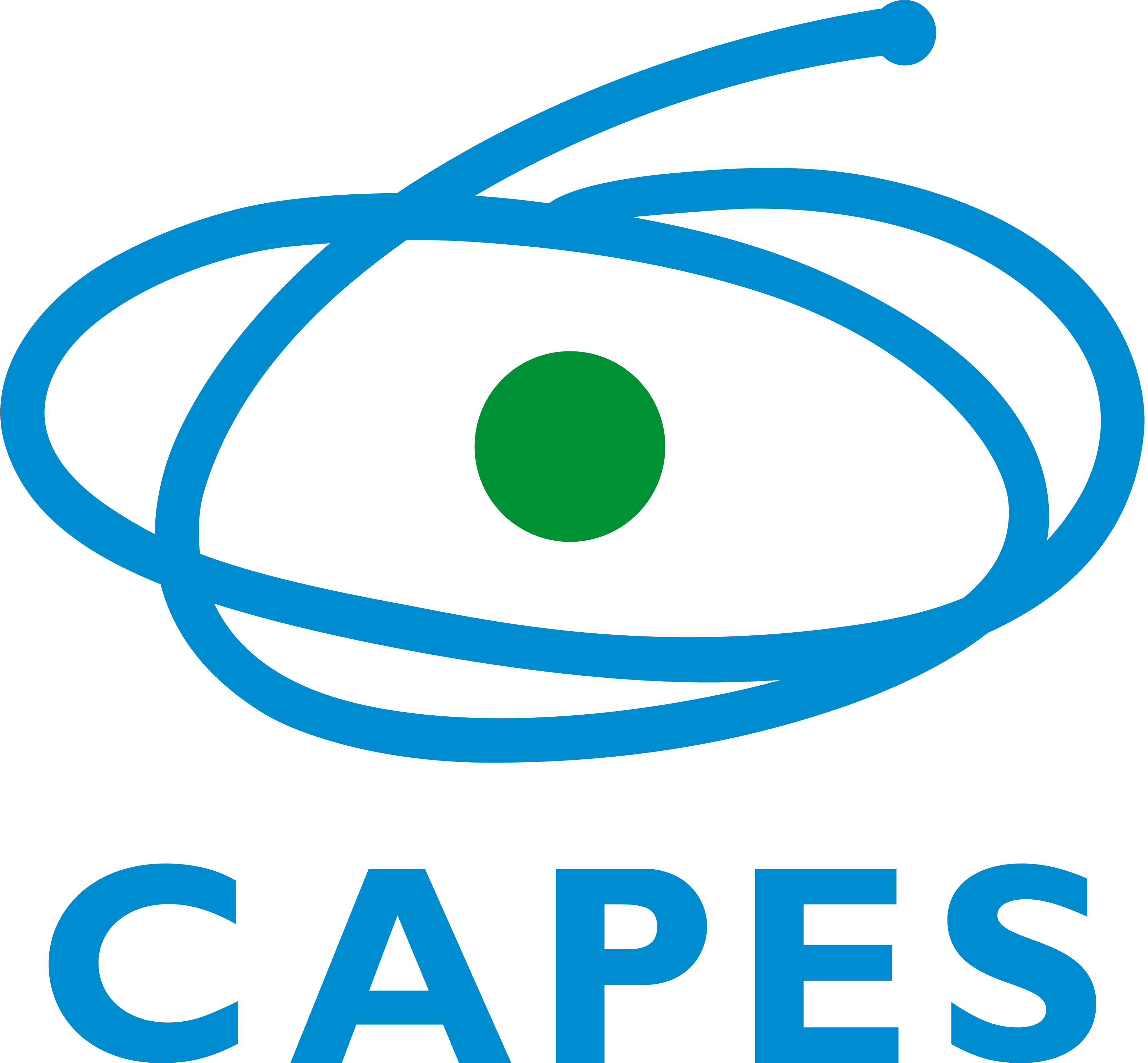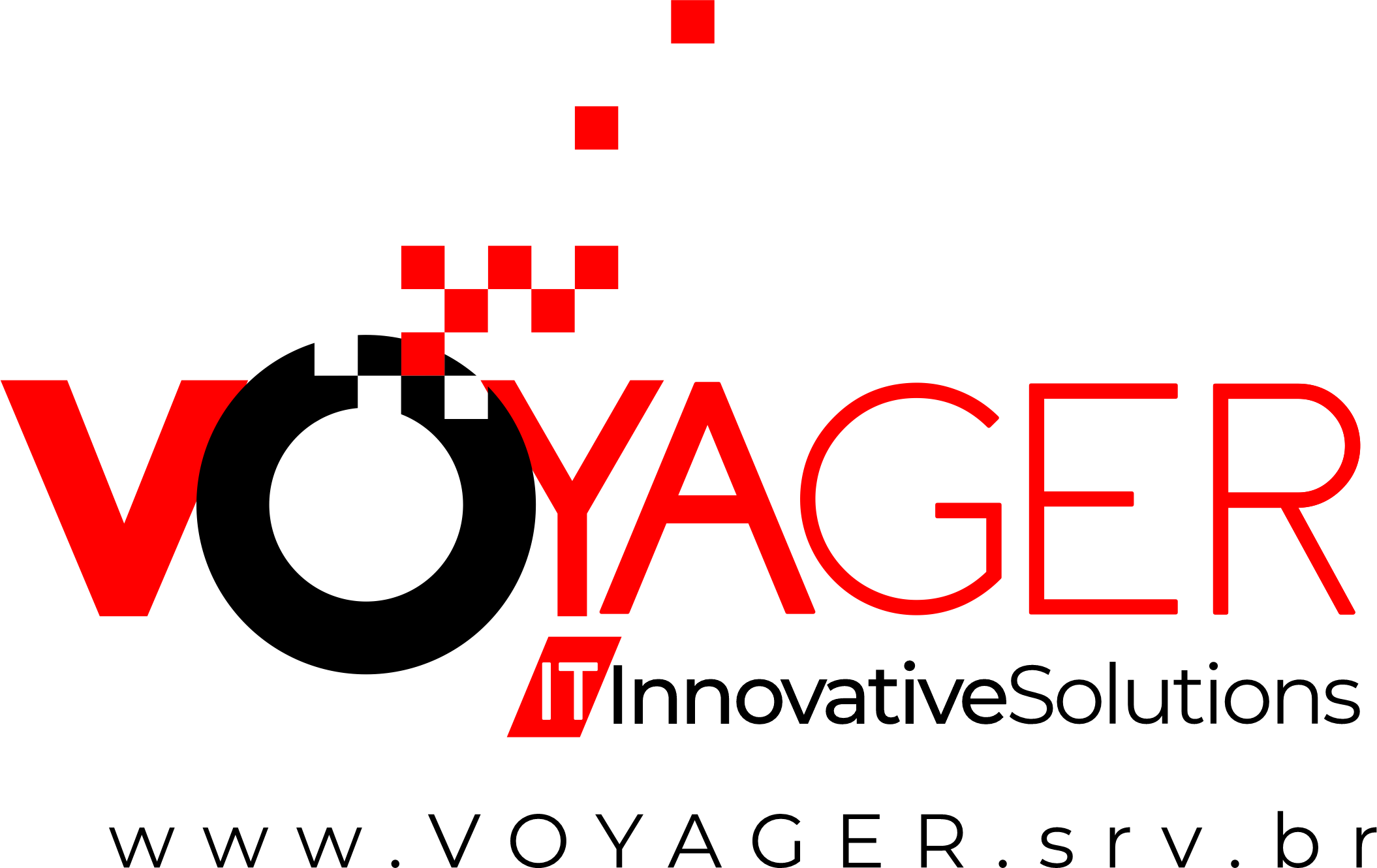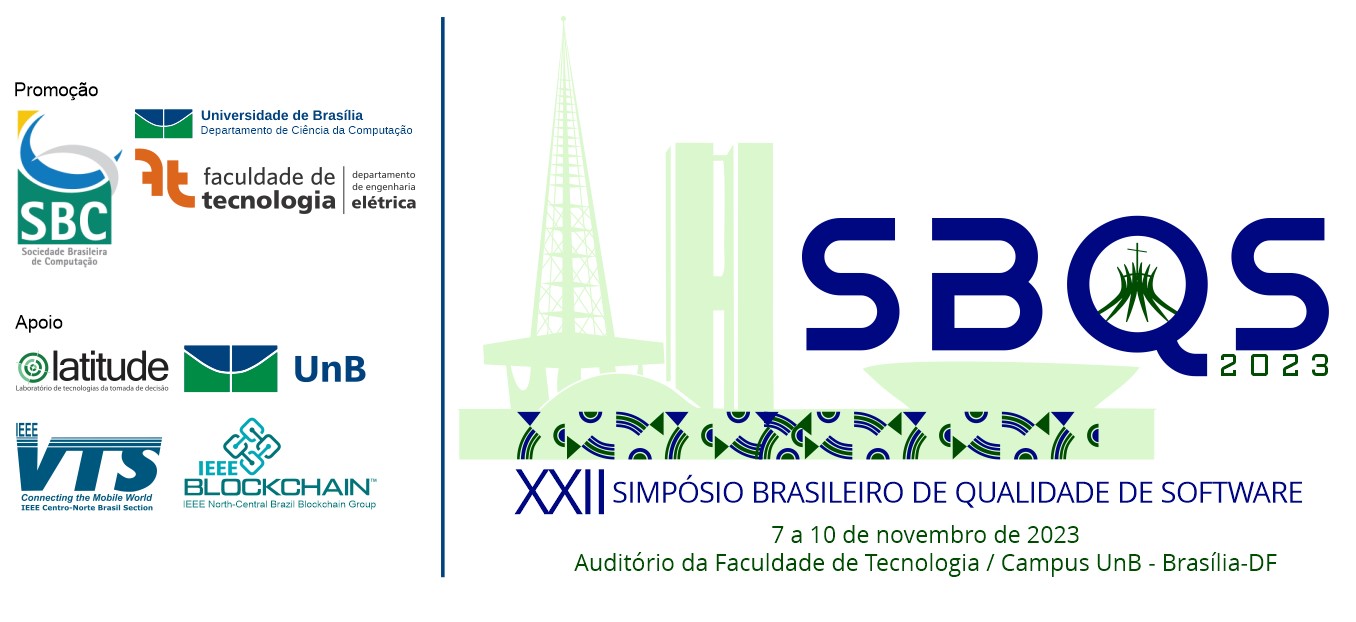CALL FOR PAPERS - EXPERIENCE REPORTS TRACK
SBQS 2023: The 22nd Brazilian Symposium on Software Quality
November 7th to 10th, 2023, 2023, Brasília, DF, Brazil
THE SBQS
The Brazilian Symposium on Software Quality (SBQS) is the main Brazilian forum dedicated to Software Quality. The quality of the software is manifested in two complementary and dependent aspects: Process Quality and Product Quality. With the current heavy reliance on software and aggregated services, research into software quality and its application in products and services is both a necessity and a differential to provide value to organizations and their businesses.
Since its inception, the SBQS has excelled in the exchange of experiences between academia and industry, where researchers, educators, and the Software Quality and Software Engineering practice community meet to present and discuss ideas, experiences, and discoveries with a view to the potential to positively influence the software industry.
Aim and Scope
The Experience Reports Track is mainly interested in contributions that are based on practical cases, where approaches, models, techniques, tools, etc. that support Software Quality have been used in companies, generating new knowledge after its evaluation. Its main purpose is to bring to the SBQS audience experiences that can be discussed and implemented by other companies and/or considered relevant knowledge for future research on Software Quality.
The report should describe in detail the experience, the context in which it took place, and discuss the results and how they were achieved. When applicable, it should also discuss lessons learned, such as what worked and what has not worked, and why, among others. Scientific rigor in the description is desired, but not mandatory.
Topics of Interest
Submissions on all topics related to Software Quality are welcome. Topics of interest to the track include (but are not limited to):
- High Maturity and Statistical Process Control
- Acquisition of Software Products
- Acquisition of IT Services
- Process Evaluation
- Product Rating
- Requirements Engineering
- Continuous Software Engineering
- Human Factors and Social Aspects in Software Quality
- Quality Assurance of IT Services
- Software Quality Assurance
- Configuration Management
- Knowledge Management and Organizational Learning
- Portfolio and Project Management
- People management
- Software Process Lines
- Software Product Lines
- Software Maintenance and Evolution
- Software Measurement
- IT Service Process Improvement
- Software Process Improvement
- Agile Software Development Methods
- Process Modeling
- Models and Standards of Capacity and Maturity
- Software Processes, Methods, and Tools
- Design and Integration of Software and IT Services
- Quality of Software applied to IT Services
- Sevices and Software Reuse
- Usability and User Experience
- Value in Software Quality
- Verification, Validation, and Testing
Evaluation Criteria
Papers in this track will be evaluated considering:
- Adherence: the paper must describe an experience report that occurred in the industry (e.g, Startups, Software development companies, R&D projects);
- Originality: the paper needs to present an original experience not previously published;
- Usefulness for industry: degree of potential usefulness for other companies;
- Replicability: the paper needs to detail the context of the experience report (e.g., characteristics of both company and software development project) to allow the replication of the experience in other companies;
- Lessons learned: the paper needs to highlight the lessons learned in the report, as well as the whole rationale of decision-making that may be relevant to highlight the aggregated value of the work;
- Technical soundness: coherence and consistency in the description and use of Software Quality concepts; and
- Presentation: refers to the quality of the paper, including text cohesion, spelling, formatting, and readable figures and tables.
Important Dates
- Paper registration (abstract submission): July 18th, 2023 August 01st, 2023 (hard)
- Paper submission: July 25th, 2023 August 01st, 2023 (hard)
- Rebuttal period: September 4th to 13th, 2023
- Notification of acceptance: September 19th, 2023 September 26th, 2023
- Camera-ready version: September 26th, 2023 October 05th, 2023
Manuscript Preparation and Submission
All submissions must be in PDF format and follow the two-column ACM format for conferences (Interim template), available in ACM SIG Proceedings Templates. The use of LaTex (sigconf) is strongly recommended. In this case, authors should use the acmart.cls class provided in the template with the conference format enabled in the preamble of the document: \documentclass[sigconf]{acmart} and also apply the ACM-Reference-Format.bst bibliography style provided in the template: \bibliographystyle{ACM-Reference-Format}.
If authors choose to use the Word format, they should be aware that if the article is accepted, it will be the responsibility of the authors to take all actions to ensure that the file is correct and validated by the ACM system (which may require handling of macro errors or changing the article format to LaTex).
Papers should not exceed 10 pages, including all figures, tables, appendices, references, and acknowledgments. Submissions should be made electronically through the JEMS system.
Articles must be written in Portuguese or English. Submissions in English are strongly encouraged. The proceedings will be published in the ACM Digital Library and indexed by the SBC Open Library.
Submissions that do not meet the required format or are outside the scope of the Experience Report Track will be rejected without review.
The paper review process includes a rebuttal period in which authors will have access to reviewers' comments and may present arguments and responses to comments and questions submitted by reviewers before the final decision to accept or reject the paper.
The acceptance of an article implies that at least one of the authors must register to SBQS, including the respective publication fee(s), and present it in person during the event, and that authors must provide extra files required by the general chair (for example, the previous presentation video following the requested format by SBQS). Additionally, for the purpose of speeding up the publication process, authors of accepted papers must fill some forms requested by the proceedings chair on specific dates.
Paper submitted to the Track of Experience Reports must not have been simultaneously submitted to another forum (scientific or periodic event), nor have they been previously published.
Anonimization
The SBQS 2023 Experience Reports Track adopts a double-blind review process. Thus, submitted papers must omit any information that would allow their authors to be identified. To this end:
- Authorship information should be omitted (i.e., the paper should not include authors' names and affiliations, as well as other information that would allow authors to be identified, such as university name, project identification, or funding information);
- References to previous work by the authors should be presented in the third person (e.g., use "in the work of Sousa et al." instead of "in our work") or by anonymizing the reference in the references section (e.g., instead of "this work evolves the proposal of Sousa et al.", one can use "this work evolves our previous proposal presented in [ref]", and the reference [ref] can be included as "[ref] Reference omitted due to double-blind review" in the references section);
- If the paper includes links to artifacts related to the work, only repositories or websites that do not allow identification of the authors should be cited. To anonymize GitHub-based repositories you can use the anonymous service (https://anonymous.4open.science/).
Note that reviewers will not be encouraged to search other sources for references that identify the authors. Searching digital libraries or existing artifacts does not compromise the double-blind review process.
If the article is accepted, information omitted in the submitted version should be included in the final version.
Use of AI-assisted technologies in papers submitted to SBQS 2023
Papers submitted to the SBQS 2023 tracks should strictly follow the guidelines below regarding the use of AI or AI-assisted technologies (they were inspired by Elsevier and International Conference on Machine Learning policies).
What is forbidden:
- Text or image produced/generated entirely by AI or AI-assisted technologies; and
- Any AI or AI-assisted technology as an author.
What is allowed:
- Using AI or AI-assisted technologies for editing or polishing author-written text;
- Using AI or AI-assisted technologies for improving the quality of images regarding contrast and clarity; and
- Investigating the use of AI or AI-assisted technologies to support Software Engineering activities relevant to Software Quality.
Best Paper Award
SBQS rewards the best article of each track every year. The Experience Reports Track Chairs and SBQS Steering Committee will choose the winning paper in this track from the Program Committee reviews. The award-winning articles are announced at the event.
Authors of the best papers are invited to submit extended versions for publication in a special issue of the Journal of Software Engineering Research and Development (JSERD).
Program Committee Co-Chairs
CSheila Reinehr (PUCPR)
Sergio Soares (UFPE)
SBQS Steering Committee
Adriano Bessa Albuquerque (UNIFOR)
Davi Viana (UFMA)
Edna Dias Canedo (UnB)
Gleison Santos (UNIRIO)
Ivan Machado (UFBA)
Monalessa Perini Barcellos (UFES)
Rodrigo Santos (UNIRIO)
Sheila Reinehr (PUCPR)
Tayana Conte (UFAM)
Proceedings Chair
Simone Dornelas Costa (UFES)
Program Committee
(to be defined)

